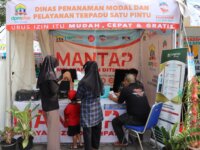Incheon City initiated a demonstration project utilizing AI technology to assist tourists and multicultural citizens in effectively communicating their symptoms to healthcare professionals. Mediark Inc. was chosen for this project through a public tender. The city supports the AI technology's development and demonstration costs, collaborating with Mediark Inc., the Incheon Medical Association, and the Pharmaceutical Association. Mediark Inc. introduced the SIMTOMI app in November 2023.
Case Study Library
Where innovations are collected and shared to disseminate and replicate good ideas

Innovations:
0
This website, as well as any data and map included herein, are without prejudice to the status of or sovereignty over any territory, to the delimitation of international frontiers and boundaries and to the name of any territory, city or area.
vCity is a human-centric platform for urban digital twins, with the goal of improving life quality within the city by assisting urban planners make evidence-driven urban decisions. vCity's innovative approach combines 1) simulation by designing virtual replicas of the cities, 2) what-if scenario tools in urban planning and 3) getting the "pulse" of the city from digital platforms for citizen participation.
13 Fellows from 10 different African countries in 8 institutions of the African Union to build a culture of digital innovation: the AU Digital and Innovation Fellowship is the first supranational initiative to make administrative processes in the African Union more user-centred and effective. The challenge: 12 months to integrate innovation into the African Unions processes and products. The results: 11 products in diverse AU institutions and units. And that is just the start!
The Government of Canada is experimenting writing existing laws and proposed regulations into code. Encoding rules allows us to run legal simulations in the regulatory drafting room, which helps us detect ambiguities, loopholes, and gaps in the rules that often go unnoticed. However, existing tools designed by and for programmers are not intuitive for rule-makers. In response, we set out to develop one – an open-source Rules as Code tool called Blawx.
India has several small cities lacking resources which has prevented them from offering digital services. To reduce the digital divide amongst the towns and cities and to ensure availability of digital services across the urban landscape of the country, NUDM attempts to offer a free, ready-made, and open-source software platform to cities and/or collectives (states). This platform is a choice-based model that benefits cities of varied maturity levels and preserves their existing investments.
Zaragoza City Council has launched a new electronic citizen participation platform with the aim of involving its citizens in public policy decisions and in the design of its services. It provides an interactive space for residents to actively contribute, strengthening the collaboration between the administration and the community, thus fostering a more inclusive and transparent management.
The Network of Public Services (NPD) was established to collectively support and inspire public services, share knowledge and expertise and to lobby policy and politics. The NPD is an informal network of over 80 public services. Together, we present a strong voice towards politics and policy to make our wishes feasible, aiming for improving public services for citizens and entrepreneurs.
The Ministry of Environment, Water, and Agriculture in Saudi Arabia proudly introduces the innovative mobile application called Livestock Chain as a groundbreaking solution leveraging Blockchain technology to effectively manage livestock data within the all country regions. This visionary application is designed to preserve the rich heritage of livestock while offering a secure mechanism for data storage and retrieval, by assigning each livestock a unique identifier.
A flourishing private sector is essential to the development of Oman’s economy. Encouraging and helping foreign entrepreneurs and investors to set up and run businesses in Oman is vital to achieving this objective. The Oman Business Platform is a one-stop-shop platform that provides fast and easy access to all relevant e-services for foreign investors planning to set up and manage companies, helping to make Oman one of the most welcoming and efficient business environments in the world.
The investment and business sector in Serang City, especially for small-scale, is still facing licensing constraints. Easy Business License in One Step, comes as solution that allows business licensing and education services to the community, will be conducted at the village and sub-district, instead of having to go to the Investment and One-Stop Office. It will cut bureaucratic red tape so that people with time constraints, lack of understanding, and people with disabilities can be served.





